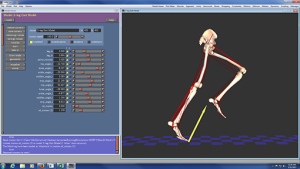by Sarah Jacobsen
Idaho Public Radio
Though it is unknown to many, people who use a prosthetic often deal with pain caused by the very devices that help them move.
An assistant professor of Biological Sciences at The University of Idaho, Craig McGowan, is studying the mechanics of movement in an effort to provide companies with the data to design protheses created to work with the body’s neuro-muscular system, and in turn, eliminate pain.
“The long-term goal is to have a device that enables people to have healthy, active lifestyles without pain,” McGowan said.
Funded through a one year Murdock Foundation Exceptional Opportunity Grant, McGowan and his students are developing a computer simulation, modeling how prostheses designed for running interact with the body.
(Prosthetic screen shot courtesy University of Idaho)
By studying athletes, McGowan’s team can understand the highest level of performance with these devices, setting a target for normal individuals.
This simulation’s first phase models a non-amputee, but is refined to show the way muscles are activated and work together down to the finest detail.
The second phase,which is currently in progress, is a simulation of an amputee using prostheses.
McGowan is now testing his model against data from amputee runners, the majority of whom are current of former Paralympic athletes.
McGowan’s long term goal is to create a device that enables people to have a healthy, active lifestyle without pain.
Posted May 27, 2015
-END-
